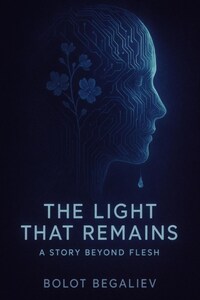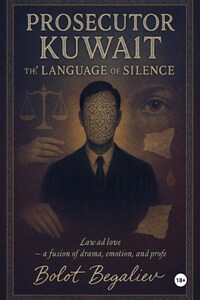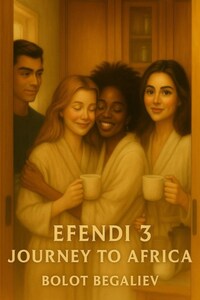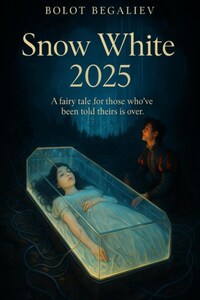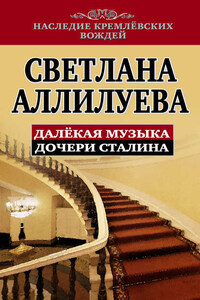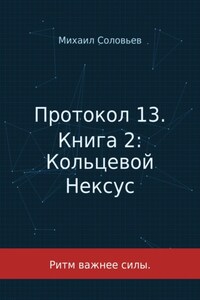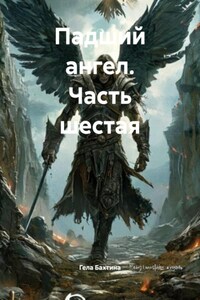Chapter One. Manhattan Between the Lines
Efendi stood at the window on the twenty-eighth floor of a business hotel on Fifth Avenue. Below him the city roared—horns, rushing crowds, screens flashing light. Behind his back a forum on green energy was in full swing, all charts and projections, but his thoughts wandered far beyond statistics.
She appeared like a bright line in a dull report: Mary Joan, a blonde with freckles, a sly half-smile, and a heavy medical dissertation on the impact of stress on the human mind.
“You’re pretending to care about all this too?” she whispered at the coffee stand.
“I’m here to talk about hydroelectric power. And you?”
“To drink free coffee and remind myself why I chose a topic that puts me to sleep.”
They laughed.
Later they walked: Central Park dusted with snow, yellow cabs streaking past, skyscraper glass mirroring their shadows. Efendi told her about Alai, about a stubborn donkey, about cryptocurrency, and the time his cat dragged his recovery phrase into the sofa cushions. Mary laughed so hard she had to stop under a lamppost, holding her stomach.
“You are the strangest person I’ve ever met. Philosophy of the steppe mixed with Uber-driver jokes. Unexpected. And refreshing.”
Stories spilled out one after another: about Columbus and the Native who first asked, “America, is it?”; about travelers forced to choose between death and a mysterious “kakatumba”; about a nightclub in a dog’s fur, where lice held raves and fought battles—“armpit against backside.”
Mary laughed until tears blurred her eyes.
“Wait—lice in a nightclub… on a dog’s head?! That’s brilliant. I’m telling my students. The backside louse is the perfect symbol of inner conflict.”
“And what about ‘death, but only after the kakatumba’? Did you like that one?” Efendi asked.
“I howled! You’re not just a romantic—you’re walking stand-up with a poet’s eyes.”
He shrugged, embarrassed.
“In Alai we say: if you’ve made a woman laugh, she’ll either marry you or make you soup. Either way—you win.”
Mary leaned across the table.
“And what if she laughs and then thinks about you at night?”
“Then it doesn’t matter how many men she’s known. The jokes will belong only to one.”
That evening they walked through Brooklyn. At her doorway Mary smiled.
“If a man makes me laugh three times in one night, he deserves a cup of coffee. Mine’s good—cinnamon. And no kakatumba.”
“And if I laugh a fourth time?”
“Then it’s your fault if you end up staying till morning.”
It was simple—just coffee. Her apartment was warm and unpretentious: light-gray walls, wooden floor, shelves of books, posters, one reading Be kind. It’s gangster. The kitchen smelled of cinnamon.
“Shoes off. And don’t ask why my slippers look like moose.”
They sat with steaming mugs a soft rap beat in the background. Efendi said,
“In Alai we have rap too—only with a komuz.”
She pulled Matilda by Roald Dahl from a shelf.
“The first book that told me I wasn’t the only strange one.”
“That’s not just about a girl. It’s about strength when you’re underestimated.”
“Exactly.”
They fell quiet. Outside, amid New York’s blaze, it felt as if the two of them had found a small island without noise.
And yet he was not like the others. At the door, holding his coat, Efendi said,
“Thank you for tonight, Mary. It wasn’t ordinary.”
“With you, nothing comes out ordinary—it just feels natural.”
“I’d stay,” he admitted, “but I don’t want to ruin what’s just beginning.”
She stepped closer, touched his collar. He kissed her—calmly, without urgency. As if to say: I’m here. I’m near. I’m real.
Later Mary sat with a book in her hands but didn’t read. She smiled.
“He didn’t even stay… and why does that feel warmer than if he had? He’s like the pause between notes. In that silence, I hear myself.”

